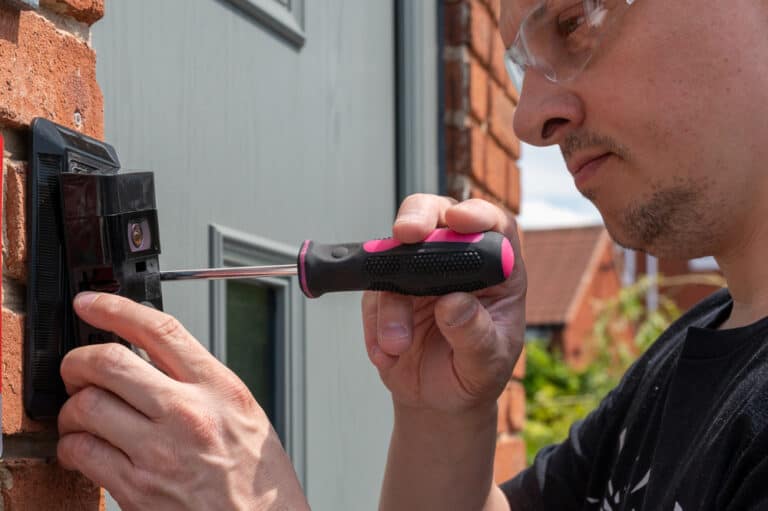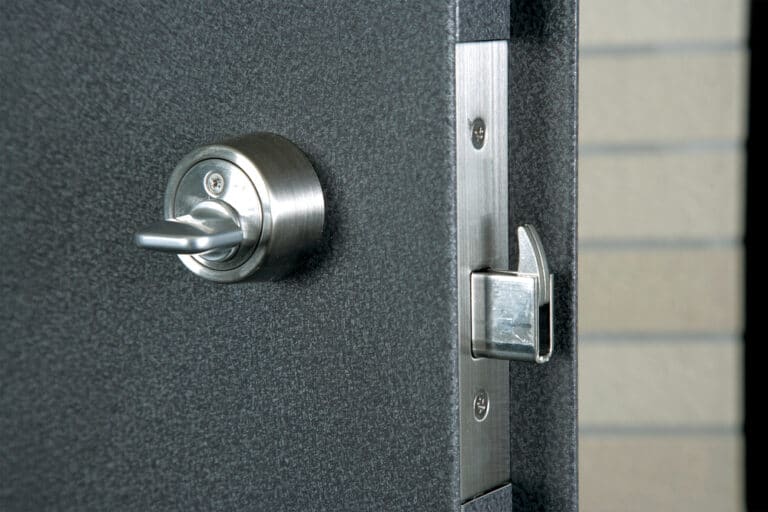As an Amazon Associate we earn from qualifying purchases.
Keeping your garage door moving smoothly means keeping it properly lubricated. But with so many different products on the market, how do you choose the right one for the job?
That’s where we can help! We’ve scouted out eight of the best garage door lubricants available right now. And we’re going to give you all the info on their benefits, as well as any drawbacks to be aware of.
Ready to find the perfect lubricant for your garage door? Step this way…
Quick Pick: Best garage door lubricants
Best garage door lubricants
1. 3-in-1 Garage Door Lube (Our Top Pick)
As its name suggests, 3-in-1’s Garage Door Lube is specifically designed to unstick your garage doors. And it works just as well for domestic as commercial premises. It can be used on garage door tracks, hinges, pulleys, chains and latches – every part, in fact, that could lead to your doors sticking or squeaking.
It dries quickly, without leaving behind any messy residue. And the silicone-based formula provides a friction-free coating that helps prevent dirt and dust building up after use. That means your garage doors will keep moving smoothly for longer before a repeat application is required.
Nevertheless, the silicone-based formula doesn’t last quite as long as lithium-based lubricants. Expect to reapply it once a month at least. Some people have found that once a fortnight is necessary.
It comes in a can with a built-in straw delivery system, allowing you to choose between a wide fan spray and a narrow jet stream. Flip the straw down to spray, and up to stream.
The straw is long and thin, which also helps you direct the lube exactly where you need it. Use it sparingly and wipe off any excess straight away. It can damage paintwork if left in place. And take care to avoid getting it anywhere near a motor or it can damage that too.
There are two versions of this can, one with the straw attached to the side and the other with it fully integrated. The latter is easier to use, though a little more expensive.
Pros:
- Easy to direct where you need it using the long straw
- Choice of spray or stream application
- Dries quickly without leaving behind any sticky residue
Cons:
- Use it sparingly – it can cause damage if it gets onto paintwork or into the motor
- Doesn’t last as long as lithium-based formulations
2. Blaster Premium Silicone Garage Door Lubricant
Blaster’s lubricant is another silicone-based product specially formulated for garage doors. It uses Teflon fluoropolymer to reduce friction and wear and tear. It leaves behind a tack-free film that prevents dust and dirt from building up on tracks and mechanisms. And it prevents squeals as the door opens and closes.
Unlike grease-based formulations, it won’t leave behind any sticky residue either. It’s applied via a straw that’s attached to the outside of the can. Or at least, that’s where the straw should be. We’ve heard a few complaints from customers who received cans that don’t have it attached.
As long as the straw is present and correct, this is super-easy to use – just point and spray. Each can contains 9.3 ounces of lubricant, which isn’t as much as some. You might find you use most of a can per application.
Pros:
- Great at preventing squeaks and squeals
- Reduces friction, so it reduces wear and tear on your garage door too
- Doesn’t leave behind any sticky residue
Cons:
- The cans aren’t as big as some
- Watch out for cans that don’t have the straws attached
3. WD-40 Specialist White Lithium Grease
WD-40’s white lithium grease spray is a great choice for any location where metals grind against each other. That makes it perfect for garage door tracks, as well as sprockets, gears, cables, hinges, latches and pulleys. It provides heavy duty lubrication and protects against corrosion and rust.
It sprays on easily with an integrated “smart straw”. That can be set to two positions for either a wide-angle spray or a narrow jet. It sprays on evenly in liquid form, providing a thick, protective coating. And it won’t freeze or run, even in extreme temperatures. It stays effective from 0 to 300 degrees Fahrenheit.
Its thick coating is able to cope with extreme pressure – up to 1,403 pounds. That’s over 1.5 times as much as its nearest competitor. It’s long-lasting too: WD40 claims it lasts eight times as long as its competitors.
One downside, though, is that it does leave behind a thick, white residue. And that residue isn’t easy to clean off, particularly from wood. Use it with care and be prepared to use some elbow grease if you spray too much.
And we’ve heard of a couple of instances where the integrated straw has slipped out of position. Watch out if that happens, as things can get messy fast. But you can twist the straw free from its hinge and stick it into the hole in the lid instead.
Pros:
- Can handle extreme pressure, ideal for areas experiencing lots of wear and tear
- Protects against corrosion and rust
- Long-lasting
Cons:
- Leaves behind a white residue that’s tough to remove
- Watch out for the straw coming out of position.
4. WD-40 Original Formula
The classic WD-40 has been used for lubricating all sorts through the ages. From curing squeaking hinges to removing chewing gum, it’s been a staple in homes across the country. And it can be a good choice for problem garage doors too.
It works by loosening and removing rust, preventing corrosion, getting rid of moisture in electrical systems, removing grime and lubricating moving parts.
It has an integrated straw which can be flipped up or down to produce either a wide spray or a direct stream. It’s easy to use, and it won’t leave behind any sticky mess. We have, though, come across a handful of cases where cans have had defective straws.
WD40 work hard on their environmental credentials too. Every part of the can is recyclable, and the product meets VOC standards in all 50 states.
It isn’t the heaviest duty product, though. If you’re looking for a lubricant for areas of higher wear and tear, there are better options out there. But it’s great at curing garage doors of squeaks and squeals, and it has multiple other uses into the bargain.
Pros:
- Great at curing squeaking door tracks
- Easy to use
- Multiple applications around the home and workshop
Cons:
- Not the best option for areas of heavier wear and tear
- Watch out for the occasional defective straw which can make application tricky
5. CRC Heavy Duty Silicone Lubricant
If you’re looking for a heavier duty lubricant, this one from CRC could be the perfect choice. It uses silicone to prevent rust and corrosion and eliminate annoying squeaks. It does that by creating a thin film across the surface to be protected, providing a barrier to moisture and debris.
It can be used on metal, wood, rubber or nylon, but keep it away from paintwork – it can cause visible damage. But the straw is attached to the outside of the can, which means it’s prone to going missing. And if you get a can without a straw, it will be considerably more difficult to apply the lube.
It will withstand harsh conditions and can be used in extreme temperatures and moist environments. It isn’t greasy, and it won’t leave behind a messy residue.
It’s good value too, comparing well to better known brands and offering comparable performance.
Pros:
- Heavier duty silicone based lubricant
- Doesn’t leave behind any messy residue
- Stays effective in extreme temperatures and moist conditions
Cons:
- Will cause damage if it comes into contact with paintwork
- Watch out for cans that are missing their application straws
6. DuPont Non-Stick Dry Film Lubricant Aerosol
DuPont’s lubricant creates a non-stick dry film over whatever it’s sprayed on. It uses resin-bonding technology, so it will stay put on metal-on-metal applications.
It stays effective over an astonishingly wide range of temperatures – from minus 100 to 480 degrees Fahrenheit. It uses ceramic-based Teflon rather than silicone, and it’s great for surfaces that slide over each other, like treadmills or garage door tracks.
It goes on wet to penetrate effectively, but then dries to a non-oily finish. And it won’t stain anything either. It’s nice and thin, so works well for any applications that have a tight tolerance. And it repels dust, dirt and grime.
It comes in a choice of 10 or 14-ounce spray bottles. There’s no straw here, so it’s not quite as easy to get into the tightest nooks and crannies. Instead, you just press down on the nozzle and direct the spray by hand.
Some people have found that the hole in the nozzle is a little too large for their liking. That can make it a little tricky to direct the lube exactly where you want it, and to avoid spraying on too much.
Pros:
- Suitable for a wide range of uses around the home and workshop
- Dry, non-oily finish repels dirt and grime
- Effective in temperatures from minus 100 to 480 degrees Fahrenheit
Cons:
- No straw, so not quite so easy to get into tight spaces
- Some people have found the hole in the nozzle is too big to apply the lube neatly
7. Genie Screw Drive Garage Door Opener Lubricant
Genie has made a particularly niche product for those with problem garage door openers. This lubricant is designed specifically for the screw drive rail in Genie brand garage door openers. It’s designed to be used once a year to keep the rail moving smoothly.
It comes in a small tube with a precision nozzle so you can direct it where it’s needed. Each tube contains only 4 fluid ounces. Genie say that’s enough to lubricate a whole screw drive rail once, and the tubes are sold in packs of three. In theory, then, that should give you enough product for three years of applications.
In practice, though, you might find you need at least a tube and a half per application. Some people have even found they’ve used all three tubes to complete the job.
The formulation uses lithium grease and it goes on easily. It’s the only product recommended for Genie door openers, and the directions for use are very specific. It goes on in 1-inch dabs at three points along the screw rail.
It will keep the mechanism moving smoothly, even in cold weather. But it is fairly pricey in comparison with other products.
Pros:
- Effective lubrication for the screw drive rails in Genie garage door openers
- Only needs to be applied once a year
- Easy to apply with the precision nozzle
Cons:
- Tiny tubes – you may find you need more than one per application
- Pricey in comparison with other lubricants
8. A Professional Garage Door Lubricant
A Professional’s lubricant contains no silicone. It’s used by professional garage door servicing companies to free up frozen parts, prevent rust and corrosion, and stop dirt building up.
It comes in a 15-ounce can and it has a three-way nozzle. Twist it around and it will spray from a fine mist to a focused jet.
It’s easy to use. First use a wire brush to remove rust and dirt from the surface to be treated. Then give the can a good shake and spray thickly and uniformly over the required area from a distance of between 8 and 16 inches. It will form a pliable yet firm coating that bonds tight to metal surfaces.
There’s not much to dislike here, but it is rather expensive. The price per fluid ounce is twice that of the DuPont lubricant, for example.
Pros:
- Prevents rust and corrosion
- Inhibits the build up of dirt and grim
- Easy to use, with a three-way nozzle on the can
Cons:
- Pretty expensive
Time to choose!
That brings us to the end of our look at eight of the best garage door lubricants out there. We hope we’ve helped you narrow down your shortlist.
Our favorite is 3-in-1’s Garage Door Lube. It’s easy to use, dries fast, and doesn’t leave behind any sticky residue. And it does everything you need it to, killing squeaks and keeping your garage door moving smoothly.
Whatever option is right for you, we hope you’re soon enjoying the convenience of a garage door that’s as good as new. Happy shopping!















How about adding a con that lithium grease is only rated down to 25C? If you live in cold weather it will cake on the tracks and rollers and make your garage door much harder to open.
The working temperature range for white lithium grease is -25C to 130 C.
WOW! Thanks for the info. WD-40 is indeed the ultimate name when it comes to best sprays and lubricants
Very helpful review of all the major products on the market. I have an old (circa 1980’s) Genie screw drive and made the mistake early on of using Lubriplate on it instead of the recommended Genie product. Actually made the noise/running problem worse… never considered the differences in the expansion rates between a steel screw and the aluminium track it ran in. Had to take the track down, clean with a solvent, re-install & re-lubricate with the Genie product. Worked like a charm and it’s a lesson I learned years ago and wouldn’t make again.
Nice review of the commonly available products.